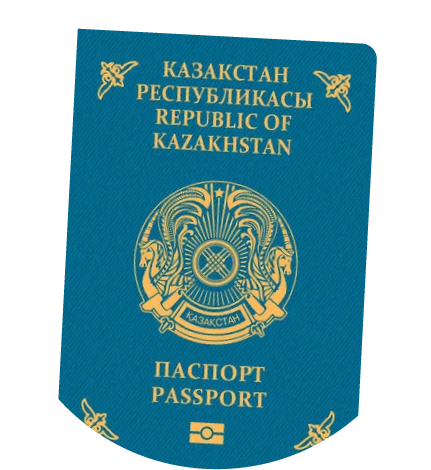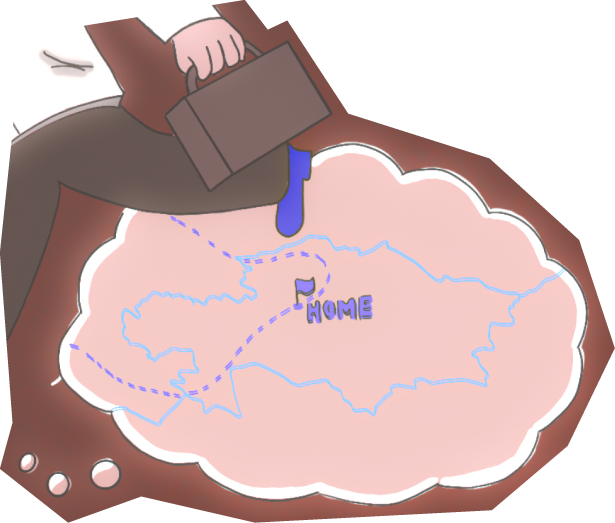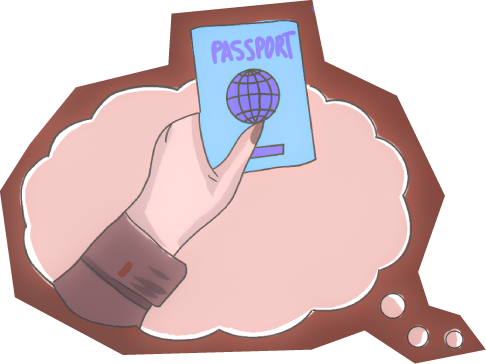
Fates of stateless people in Kazakhstan






An invisible man

61-year-old Aleksei Budnikov was born in Tver region, Russia. In 1972, he and his father and sister moved to Kazakhstan.
- "My father abandoned my sister and me in the foster care because it was difficult for him to maintain us," Aleksei said.
At the age of 18, the man joined the army, where he got sick and was sent to the reserve for health reasons. Afterwards, the man went to build the Baikal-Amur mainline. It was a huge construction site with numerous work positions. But in 1995, the Soviet project was closed, and Aleksei returned to Kazakhstan and was employed as a carpenter by a businessman.
- "I worked until two brothers once came to him and the businessman sold me to them. Thus, I fell into labour slavery. They treated me very badly, they punched me, I experienced physical abuse. I tried to flee from the very first day. I escaped, but others caught me and made me their slave," Aleksei said.
This is a typical case of people who do not have citizenship, like Aleksei. The head of public foundation "Zhana samgau", Dina Turakhmetova, noted that stateless people are often odd jobbers. Because of the lack of documents, they often fall into labour slavery. Men work in household plots, tend cattle, while women help about the house.
Aleksei Budnikov spent 30 years in labour slavery. In 2023, the police brought Aleksei to the centre for social support to persons released from prison and registered with the probation agency. Those people who do not have documents on hand are placed there.
Aleksei Budnikov spent 30 years in labour slavery. In 2023, the police brought Aleksei to the centre for social support to persons released from prison and registered with the probation agency. Those people who do not have documents on hand are placed there.

The Centre handles his documents and just recently managed to restore his birth certificate. To this end, it sent a request to Russia, and Russia confirmed that he was not a citizen of the Russian Federation. Necessary documents are being gathered now, and afterwards they will be submitted to acquire the citizenship of Kazakhstan.
However, these are not all problems of Aleksei. The man has his feet frostbitten during the slavery period.
However, these are not all problems of Aleksei. The man has his feet frostbitten during the slavery period.
- "All night long I was carrying coal inside, and did not even feel that my feet became wet. When I took off my shoes, I saw the gangrene on my feet," Aleksei said.
Now the man walks on his heels, with a cane. Aleksei used to have a family. His son Andrei and grandsons live in another country. But as long as Aleksei do not have citizenship, he will not be able to move beyond Kazakhstan.

Forward motion
Kazakhstan has stateless persons with the officially recognised status and unregistered stateless people. According to information from the UNHCR, currently there are 7,397 stateless people in the Republic of Kazakhstan, and 869 persons with unidentified citizenship.
People who do not get the official status of a "stateless person" remain invisible to the state, are deprived of rights to medical or social assistance, education, pension and allowances, cannot be legally employed or move freely. As a result, they face many problems and difficulties, are often unable to solve issues related to their legal status or identity on their own.
Kazakhstan joined the global campaign #IBelong, and was intending to eradicate statelessness by 2024. In other words, people who have no documents that determine their citizenship and people who have the official status of a stateless person must obtain citizenship of any state.
Since 2014, when the #IBelong campaign was launched, Kazakhstan has achieved significant progress in solving the statelessness issue and in preventing it. In November 2019, amendments were made to the national law to guarantee registration of all new-borns as citizens of Kazakhstan regardless of the legal or registration status of their parents. In September 2020, the national mechanism of determination of statelessness cases was introduced.
According to Denis Dzhivaga, deputy director of the Kazakhstan International Bureau for Human Rights and Rule of Law (KIBHR), it is not possible to eradicate the problem.
People who do not get the official status of a "stateless person" remain invisible to the state, are deprived of rights to medical or social assistance, education, pension and allowances, cannot be legally employed or move freely. As a result, they face many problems and difficulties, are often unable to solve issues related to their legal status or identity on their own.
Kazakhstan joined the global campaign #IBelong, and was intending to eradicate statelessness by 2024. In other words, people who have no documents that determine their citizenship and people who have the official status of a stateless person must obtain citizenship of any state.
Since 2014, when the #IBelong campaign was launched, Kazakhstan has achieved significant progress in solving the statelessness issue and in preventing it. In November 2019, amendments were made to the national law to guarantee registration of all new-borns as citizens of Kazakhstan regardless of the legal or registration status of their parents. In September 2020, the national mechanism of determination of statelessness cases was introduced.
According to Denis Dzhivaga, deputy director of the Kazakhstan International Bureau for Human Rights and Rule of Law (KIBHR), it is not possible to eradicate the problem.
- "Unfortunately, it happens that people get used to live without citizenship. They live without documents, and when we find them, we have the impression that they do not need them," Dzhivaga said.
From October 2020 to May 2022 the Committee of Migration Service of the Ministry of Interior Affairs together with the Ministry of Justice and partners of the UN Refugee Agency (UNHCR) held a wide-scale republican campaign of identification and registration to identify the scope of statelessness and to solve the problem. As a result, 8,822 people with unidentified citizenship were found: 4,868 people confirmed their citizenship of Kazakhstan and 2,683 received the status of stateless people, which gives them access to basic rights and services.
According to Dina Turakhmetova, the people who often apply for document recovery to their centre were born in the 1960s. They could not register their documents after the collapse of the Soviet Union for some reason and became stateless.

- "Since Kazakhstan gained independence, not all people changed their Soviet passport to the identity card of a Kazakhstani. The main reason is bad habits, addiction, lack of regular job. Based on the stories of people who came to our centre, many of them lived in Russia then and when they returned to Kazakhstan no one demanded their documents. So, they keep on living like that, although 30 years have passed," Turakhmetova said.
According to experts, it is much easier now to identify a person. Those who want to get an official document must go to local migration service offices in Kazakhstan, write a petition, provide any document to confirm their identity (birth certificate, school certificate, driving license).
Moreover, unregistered women who gave birth can register papers for new-borns due to the work of human rights organisations since 2020.
Moreover, unregistered women who gave birth can register papers for new-borns due to the work of human rights organisations since 2020.
- «Государство учло наши рекомендации и рекомендации УВКБ ООН. Теперь даже дети матерей без документов получают документы со слов матери. Это международный стандарт, такой анализ был приготовлен в 2015 году и только спустя 5 лет наши власти согласились принять рекомендации. Все изменения движутся очень долго, полностью невозможно сказать, что все соответствует международным стандартам. У нас не ратифицирована конвенция по статусу апатридов. Пока власть не сильно на это соглашается», — замечает Денис Дживаго.



When will statelessness be eradicated in Kazakhstan?
The story of Dmitry Vishnetsky is not new for the public foundation "Zhana samgau". Officers invited him to the centre, when they saw the man begging alms outdoors. It turned out that he worked for a long time for some man until his feet were frostbitten. Dmitry was hospitalised, his toes were amputated. After the amputation, the employer did not take Dmitry to his place. So he stayed on the street.
- "Dmitry had only a military card of the Soviet period. A few years ago, another centre restored his birth certificate, but did not have time to restore other documents. We started to restore the remaining documents. He never moved beyond Kazakhstan previously, he was the citizen. We prepared everything on the basis of the protocol of identification: there were his acquaintances in town, who identified him. It took us six months," Dina said.
According to Denis Dzhivaga, if the case of a stateless person is solved within a year, it is a very short term. Usually, one case takes up to 3-5 years. For example, KIBHR solved the case of an applicant who came to them in 2017 only in 2023.
Since the launch of the global campaign #IBelong in 2014, Kazakhstan solved over 22,835 cases of statelessness. According to experts, the next step for Kazakhstan must be accession to the UN conventions regarding statelessness. This action will emphasise the leadership of Kazakhstan in the region and will strongly demonstrate its commitment to protection of human rights. Full introduction of provisions of these Conventions will let end the problem of statelessness within a generation.
As Denis Dzhivaga said, state measures are quite effective and the problem of statelessness is not very acute in Kazakhstan. Moreover, it is not political problem, so the state allows these measures readily.
Since the launch of the global campaign #IBelong in 2014, Kazakhstan solved over 22,835 cases of statelessness. According to experts, the next step for Kazakhstan must be accession to the UN conventions regarding statelessness. This action will emphasise the leadership of Kazakhstan in the region and will strongly demonstrate its commitment to protection of human rights. Full introduction of provisions of these Conventions will let end the problem of statelessness within a generation.
As Denis Dzhivaga said, state measures are quite effective and the problem of statelessness is not very acute in Kazakhstan. Moreover, it is not political problem, so the state allows these measures readily.